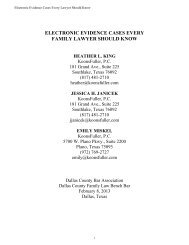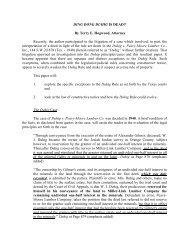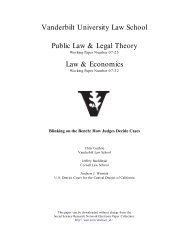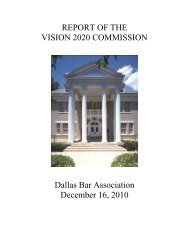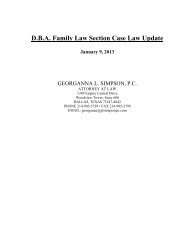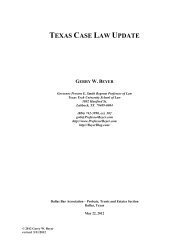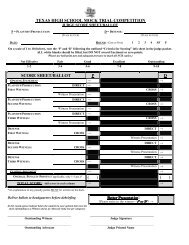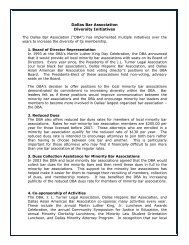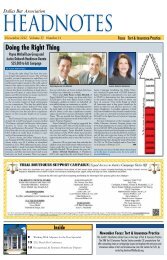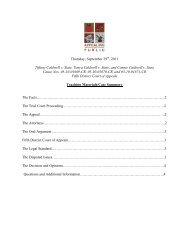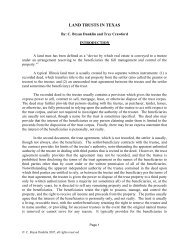subordination, nondisturbance and attornment agreements
subordination, nondisturbance and attornment agreements
subordination, nondisturbance and attornment agreements
Create successful ePaper yourself
Turn your PDF publications into a flip-book with our unique Google optimized e-Paper software.
<strong>and</strong> tenant (particularly claims by the tenant against the l<strong>and</strong>lord that might lead to rental offsetsor monetary claims against the new l<strong>and</strong>lord), whether the tenant is in possession <strong>and</strong> payingrent, or whether the tenant has accepted the l<strong>and</strong>lord’s performance regarding premisesimprovements, repairs, maintenance or other obligation performable before the foreclosure. Inthe absence of satisfactory answers to these questions, the lender or any other prospectivepurchaser should be aware that substantial risks exist that may not be known until after theforeclosure. In this situation, if the lease is superior to the mortgage, the purchaser will acquirethe interest of the former l<strong>and</strong>lord subject to whatever lease terms, claims, offsets <strong>and</strong> liabilitiesthat may exist between the tenant <strong>and</strong> the former l<strong>and</strong>lord at the time of foreclosure. If thepurchaser at foreclosure assumes the lease, expressly or by operation of law, then the purchasergenerally steps into whatever liabilities the former l<strong>and</strong>lord had to the tenant as of the date of theforeclosure.In F. Groos <strong>and</strong> Co. v. Chittim, et. al., 100 S.W.1006 (Tex. Civ. App. 1907, no writ), thecourt stated the following regarding the effect of foreclosure on a lease having priority over themortgage:[I]f the lease is anterior to the mortgage, the possession of the tenant being noticeof his rights thereunder, his leasehold estate <strong>and</strong> his right thereto are not affectedby foreclosure of the mortgage. A change of l<strong>and</strong>lords is only effected. Insteadof being the tenant of the mortgagor, [the tenant] becomes the tenant of themortgagee, or of him who by the foreclosure has acquired the reversion. He [thetenant] has every right against his new l<strong>and</strong>lord that he had under the leaseagainst the original lessor <strong>and</strong> he who acquired the reversion at the foreclosurehas every right against him [the tenant] that the lessor had under the lease. Theone who acquired the reversion st<strong>and</strong>s in the shoes of the mortgagor. The lesseest<strong>and</strong>s in his own, just as he did before. If, before the foreclosure, the lessor wasentitled to receive from the lessee the rents <strong>and</strong> profits occurring under the lease,after the foreclosure the one who acquired thereunder the reversionary estate islikewise entitled to receive them. And it would seem a logical sequence that, ifthe original lessor were not entitled to receive from the tenant the rents <strong>and</strong>profits accruing under the lease, he who acquired his title under the foreclosureproceedings would not, ordinarily, be. Id. at 1010 (emphasis added).In Ontiveros v. MBank Houston, N.A., 751 F. Supp. 128 (S.D. Tex. 1990), the courtprovides an excellent analysis of the potential pitfalls existing for a lender foreclosing a lien thatis subordinate to the lease. Ontiveros was the tenant in possession under a lease that predated themortgage. Apparently, there was no other agreement between the tenant <strong>and</strong> the lender.Subsequent to the date of the mortgage, the l<strong>and</strong>lord <strong>and</strong> the tenant modified their lease to settlea dispute <strong>and</strong>, among other <strong>agreements</strong>, the l<strong>and</strong>lord agreed to pay the tenant an improvementallowance of $125,000 on October 1, 1985. In July, 1985, the lender foreclosed <strong>and</strong> notified thetenant to make all rent payments to it. The tenant made rent payments for July, August <strong>and</strong>September, 1985. On October 1, 1985, the lender failed to pay the tenant the $125,000 dueunder the lease amendment, <strong>and</strong> the tenant sued. The court’s following holdings are helpfulteachings regarding the relationship of a foreclosing lender <strong>and</strong> a tenant whose lease predates themortgage:D-SNDAs 11-10-07 - 2 -



